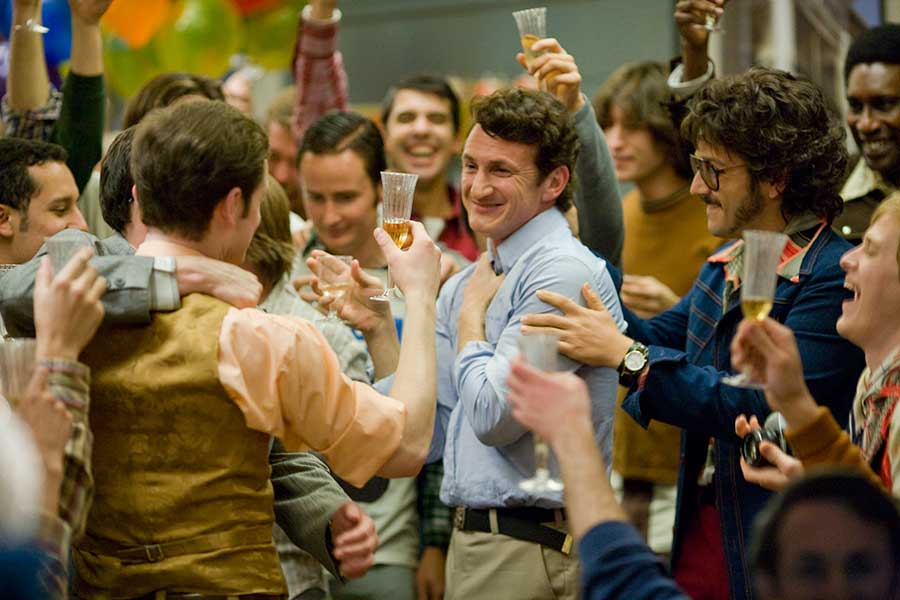Need some inspirational cinema during Pride month? Here are 10 key films, five documentaries and five features based on true stories that will likely move LGBT viewers to tears.
David France’s rousing and exceptional Oscar-nominated documentary “How to Survive a Plague” speaks volumes about how the LGBT community rallied together and formed ACT UP to fight the AIDS crisis in the 1980s. Watching unlikely activists like Peter Staley mobilizing, protesting and effectively fighting for health-care rights — as his friends and colleagues are dying — is truly heartening.
Both the Oscar-winning films “The Times of Harvey Milk,” directed by Rob Epstein, and Gus Van Sant’s feature version, “Milk,” tell the story of California’s first openly gay elected official and slain activist. These films beautifully illustrate how Milk inspired the community, which found strength working together to fight discrimination and change minds.
“The New Black” is out director Yoruba Richen’s superb and underseen 2013 documentary about homosexuality and the African-American community. Richen’s stirring film chronicles straight ally Sharon Lettman-Hicks, who fights for marriage equality in Maryland in the wake of Proposition 8 and encounters both support and hostility — even from her own family during a barbecue. Richen also addresses the topic of homophobia in the black church, interviewing Derek McCoy, an anti-marriage-equality pastor, and Tonex, a gay gospel singer. The film’s even-handed approach is what makes “The New Black” especially thoughtful and touching.
The recent documentary “The Freedom to Marry” chronicled the historic fight for same-sex marriage. Director and straight ally Edward Rosenstein’s uplifting film shows how Evan Wolfson, founder and president of advocacy group Freedom to Marry, helped shape and change public opinion on the issue. He also chronicles the heroic efforts of Mary Bonauto, who argued the landmark case in front of the Supreme Court, as well as April DeBoer and Jayne Rowse, a Michigan couple seeking marriage equality in part to protect their adopted children.
“Call Me Kuchu,” about LGBT activists in Uganda, is inspiring, but also enraging. In the African country, where homosexuality is illegal, filmmakers Katherine Fairfax Wright and Malike Zouhali-Worrall profile various LGBT citizens, including David Kato, the first openly gay man in Uganda; Naome, a lesbian activist who works for human rights; and Long Jones, an activist for health and HIV education, who dons drag in one celebratory scene. Their stories are poignant, especially in light of the fact that Giles Muame, the homophobic managing editor of “Rolling Stone,” a local newspaper, publishes the names, addresses and photos of queer Ugandans and calls for their hanging.
On the fiction side, one feel-great film is “Pride,” which chronicles the efforts of LGBT activists to raise money to support striking Welsh miners in Thatcher’s England. At a gay Pride march, the closeted Joe (George MacKay) soon finds a makeshift queer family with Mark (Ben Schnetzer), Steph (Faye Marsay), Jonathan (Dominic West) and his lover Gethin (Andrew Scott). The film artfully depicts how Joe becomes emboldened by his activism, as well as how the miners are accepting of the queer activists.
“Any Day Now” is a remarkable — and remarkably affecting — film inspired by a true story about a gay couple involved in a custody battle. Rudy (Alan Cumming), a drag queen, meets and moves in with Paul (Garret Dillahunt), a closeted lawyer in 1979 Los Angeles. Rudy wants to take care of Marco (Isaac Levya), an abandoned teenager with Down Syndrome. While Paul obtains emergency legal custody of Marco, the couple soon faces court appearances and eventually scrutiny of their queer lives. “Any Day Now” shows how hard obtaining legal rights was for same-sex couples. The film’s chronicle of justice will wring strong emotions from viewers. A heartbreaking letter Paul reads (in voice-over) rivals Cumming’s rendition of Bob Dylan’s “I Shall Be Released” for the film’s most moving scenes.
Another fine LGBT-rights drama, “Freeheld,” also deserves a look — even if it’s no surprise how the story turns out. Based on the true story (and an Oscar-winning short documentary), director Peter Sollett’s feature depicts Laurel Hester (Julianne Moore), who must fight for justice when her legal domestic partner, Stacie (Ellen Page), is denied pension benefits after Laurel develops terminal cancer. Fighting against the Freeholders of Ocean County, the couple enlists the help of Steven Goldstein (Steve Carell), a Garden State Equality activist who creates a media sensation out of their case.
“Freeheld” was written by Ron Nyswanger, who is most famous for his other, more well-known film about gay- and HIV/AIDS-rights activism, “Philadelphia.” The late Jonathan Demme’s landmark 1993 drama was Hollywood’s first studio film to address the AIDS crisis. Tom Hanks, in an Oscar-winning performance, is Andrew Beckett, a man dying of AIDS, who hires Joe Miller (Denzel Washington) to defend him in a suit he brings against the law firm that fired him for being HIV-positive. The film was criticized at the time for not making the relationship between Tom Hanks and his partner Antonio Banderas more affectionate, but there is no denying the film’s inspirational message about dignity for queer people.
